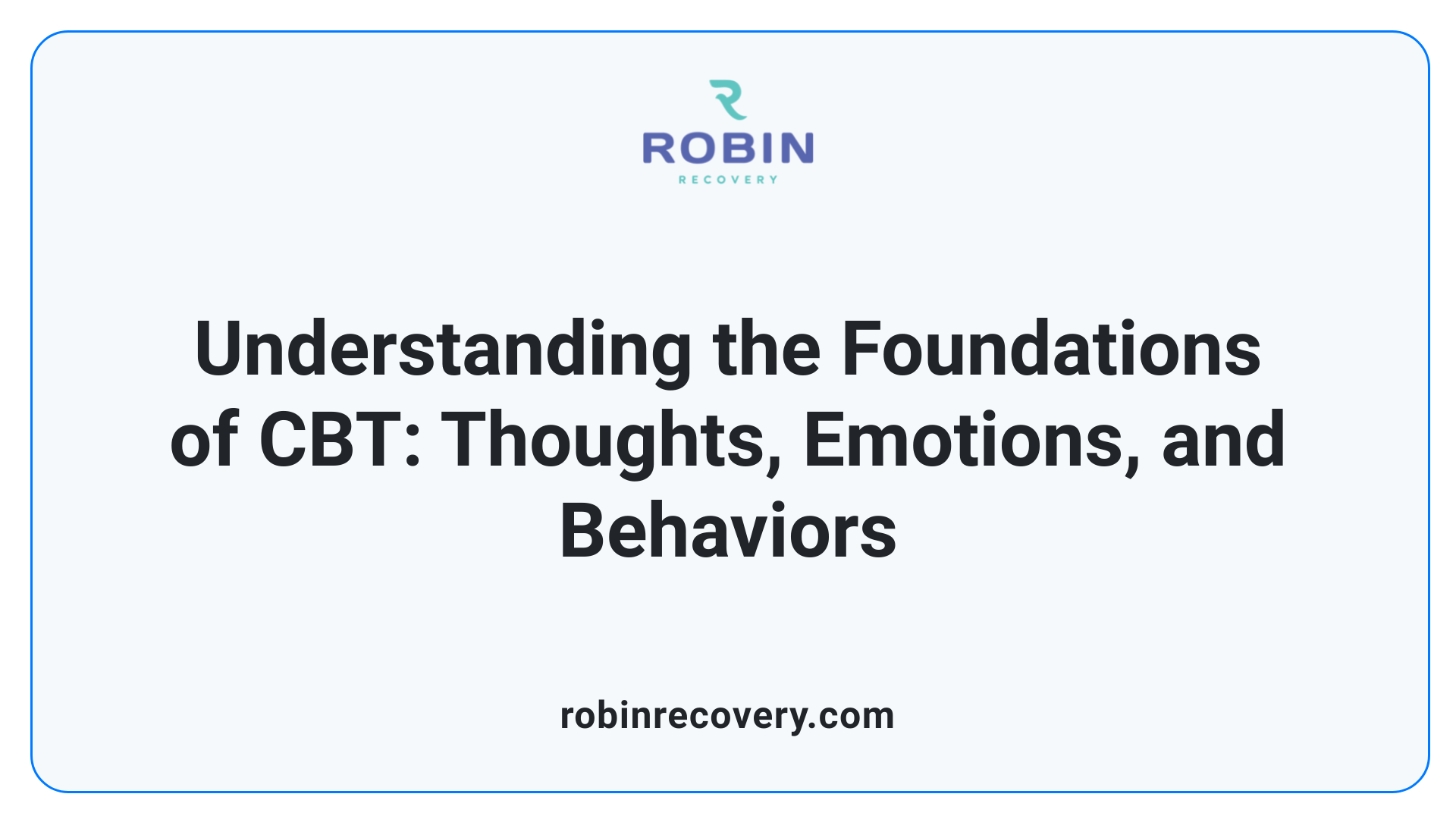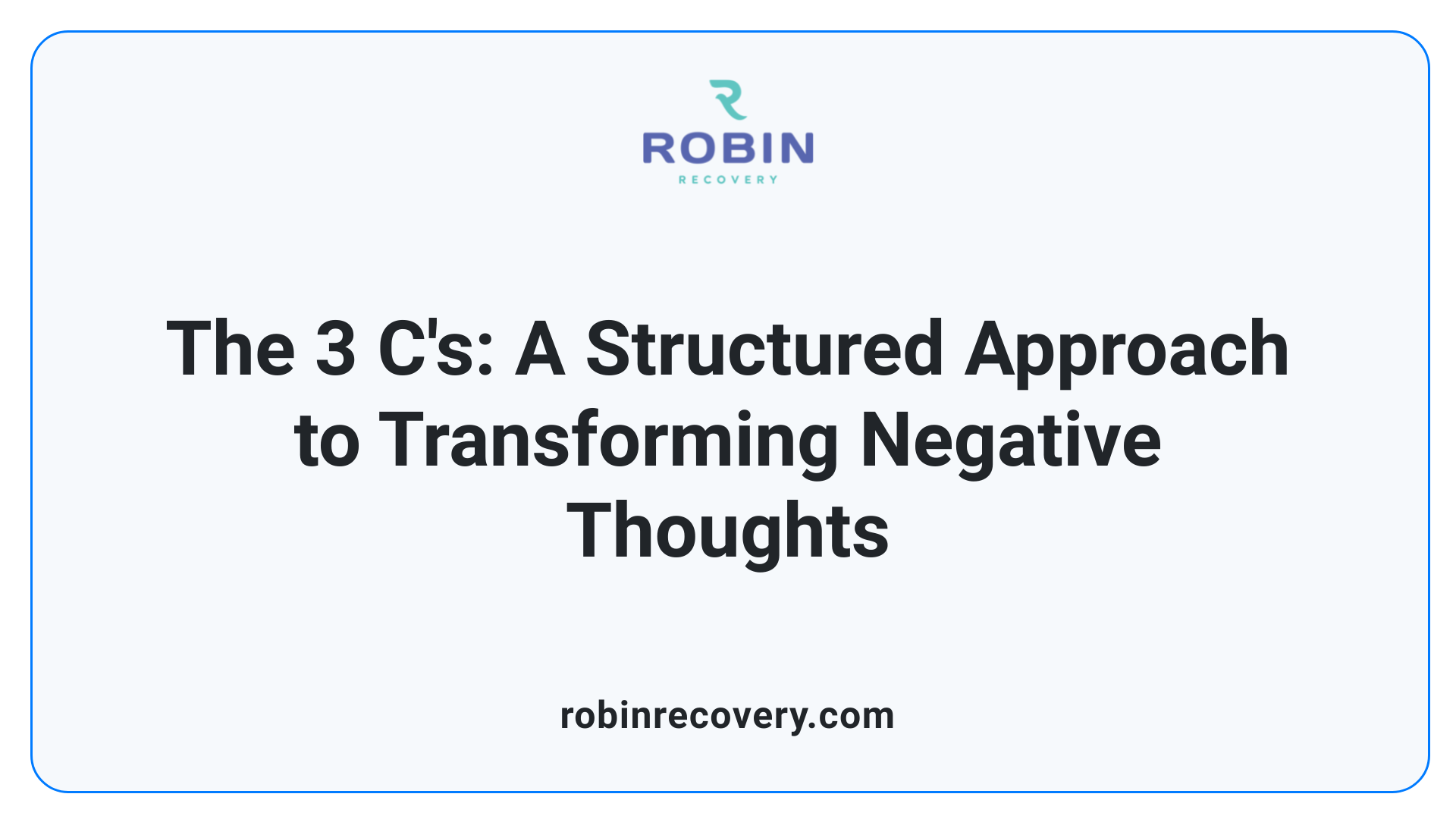Cognitive Therapy Techniques Explained Simply

Understanding Cognitive Behavioral Therapy
Cognitive Behavioral Therapy (CBT) is a widely recognized form of psychotherapy focused on identifying and altering harmful thought patterns. It combines elements of cognitive and behavioral therapy to address negative thinking and promote healthier responses. This article explores the principles, techniques, benefits, and practical applications of CBT, highlighting its effectiveness in treating a range of mental health conditions.
The Core Principles of Cognitive Behavioral Therapy

What Are the Basic Principles of CBT?
Cognitive Behavioral Therapy (CBT) revolves around several core principles that help individuals learn better ways to cope with their mental health challenges. One of the foundational ideas is the connection between thoughts, emotions, and behaviors. By understanding this interrelation, clients can recognize how negative thoughts can lead to emotional distress and unhelpful behaviors. CBT empowers clients to identify these harmful thought patterns and reshape them into healthier beliefs.
How Does Cognitive Therapy Fit In?
Cognitive therapy is the cognitive component of CBT that seeks to examine and modify distorted beliefs. In simple terms, it helps people understand and change harmful thought patterns that contribute to emotional difficulties, such as anxiety and depression. It focuses on identifying and challenging cognitive distortions like over-generalizing and catastrophizing, which can exacerbate stress in daily life.
By practicing cognitive restructuring—an essential technique in CBT—clients train themselves to replace negative thoughts with more positive, realistic ones. This process often leads to improved emotional regulation and better coping strategies, making cognitive therapy an effective tool for addressing a variety of mental health conditions.
The Impact of CBT on Mental Health
CBT is recognized for its versatility and effectiveness in treating various mental health issues, ranging from depression and anxiety to PTSD and eating disorders. It typically involves between 5 to 20 structured sessions where therapists guide clients through problem identification, skills development, and the application of learned concepts in everyday situations. The focus on practical strategies not only helps alleviate current symptoms but also equips clients with tools to handle future challenges, promoting long-term well-being.
Essential Techniques in Cognitive Behavioral Therapy

What are the techniques used in cognitive therapy?
Cognitive Behavioral Therapy (CBT) employs a variety of techniques aimed at helping individuals manage psychological distress. Here are some of the most effective methods:
- Cognitive Restructuring: This involves identifying and challenging irrational or negative thoughts. Patients learn to replace these with more balanced and realistic beliefs, enhancing their overall mental outlook.
- Behavioral Activation: This technique encourages individuals to schedule and engage in enjoyable activities, which is particularly useful for combating feelings of depression and low motivation. By actively participating in pleasurable experiences, patients can shift their emotional state positively.
- Relaxation Techniques: Methods such as diaphragmatic breathing and guided imagery are utilized to help lower physiological arousal. These practices can significantly improve emotional well-being by reducing anxiety and stress levels.
- Thought Stopping: This technique aims to interrupt negative thought patterns. While it may offer temporary relief, it's often complemented by mindfulness strategies to help manage unwanted thoughts more sustainably.
- Mindfulness and Acceptance: These are increasingly used within CBT to assist patients in observing their thoughts without judgment. This shift in focus fosters a healthy perception of distressing thoughts, allowing for greater emotional regulation.
Through these techniques, CBT supports individuals in developing healthier thought processes and behaviors, contributing to improved mental health outcomes.
The 3 C's of Cognitive Therapy

What are the 3 C's of cognitive therapy?
The "3 C's" of cognitive therapy provide a structured framework for individuals to manage negative thoughts effectively. This approach is particularly beneficial for addressing self-stigmatizing beliefs that can hinder recovery and mental wellness:
- Catch it: This first step is all about awareness. Individuals learn to identify and recognize negative thoughts as they emerge in their daily lives. By becoming more mindful of these thoughts, they can begin to understand their impact and influence.
- Check it: Once a negative thought is caught, the next step encourages individuals to evaluate its validity. This involves examining the evidence for and against the thought. Are these thoughts based on fact or distorted perceptions? This step helps to challenge irrational thinking.
- Change it: Finally, the process culminates in altering the thought patterns. Individuals focus on reframing negative thoughts into more balanced and positive ones, ultimately fostering healthier cognitive habits.
This systematic method aligns with the goals of organizations like VISN 5 MIRECC, supporting Veterans in overcoming challenges related to stigma and mental health.
How to apply the 3 C's in cognitive therapy?
Applying the "3 C's" can be a transformative process. Practicing mindfulness helps in the initial step of catching negative thoughts. Keeping a journal may assist in checking the validity of those thoughts and tracking progress over time. In therapy sessions, guided discussions can enhance the changing phase, leading to stronger coping strategies.
The 5 Steps of Cognitive Behavioral Therapy Process
What are the 5 steps of CBT?
Cognitive Behavioral Therapy (CBT) involves five key steps that guide clients through the process of understanding and modifying their thoughts and behaviors:
- Assessment and Engagement: The therapist begins with an in-depth assessment of the individual's mental health. This establishes rapport while identifying specific concerns that will be addressed in therapy.
- Identification of Negative Thoughts: Clients learn to recognize their negative automatic thoughts that contribute to emotional distress. Techniques like journaling and self-monitoring are effective tools for this step.
- Challenging Negative Thoughts: Here, clients use cognitive restructuring and techniques such as Socratic questioning to evaluate and challenge their unhelpful beliefs. This leads to a more balanced check on their thought processes.
- Behavior Modification: In this step, clients work on changing maladaptive behaviors. Techniques such as behavioral activation and exposure therapy encourage healthier habits and responses to various situations.
- Maintenance and Relapse Prevention: The final step focuses on sustaining the progress achieved during therapy. Clients practice continued self-monitoring and establish self-care routines that integrate the strategies learned into daily life.
These steps collectively illustrate how CBT effectively addresses various mental health conditions, empowering individuals to make meaningful changes in their thoughts and behaviors.
Practical Applications of CBT Techniques

How can cognitive therapy techniques be practically applied in therapy and self-help contexts?
Cognitive Behavioral Therapy (CBT) encompasses various techniques that can effectively be used in both therapy sessions and self-help scenarios. One cornerstone technique is cognitive restructuring. This approach aids individuals in identifying and reframing distorted thoughts, making it an invaluable tool in therapy. During sessions, therapists guide clients to challenge their negative beliefs, creating a clearer cognitive framework for healthy thinking.
In the realm of self-help, behavioral activation is another powerful technique. By encouraging individuals to engage in activities that promote positive feelings, it effectively combats symptoms of depression. For those who prefer self-directed methods, resources like mobile apps offer structured guidance based on CBT principles.
Furthermore, techniques such as journaling provide a way for individuals to reflect on their emotions and thoughts, enhancing their self-awareness. Journaling can be an ongoing practice, helping users track progress and provoke meaningful insights over time.
Exposure therapy can also be utilized outside of clinical settings. Individuals can gradually face their fears by confronting anxiety-inducing situations in a controlled manner, thus learning to manage their anxiety through personal experience.
Through thoughtful integration of these techniques, individuals can enhance their mental health and well-being, reinforcing CBT's versatility for diverse applications, both in therapy and self-help contexts.
Exploring Cognitive Distortions
Understanding Cognitive Distortions
Cognitive distortions are inaccurate thought patterns that lead to negative emotions and self-defeating behaviors. They act as mental filters, filtering reality in a way that exacerbates feelings of anxiety, depression, and helplessness. Common types of cognitive distortions include:
- All-or-Nothing Thinking: Viewing situations in black and white, with no middle ground.
- Overgeneralization: Seeing a single negative event as a pattern of defeat.
- Catastrophizing: Expecting the worst possible outcome from situations.
- Emotional Reasoning: Believing that feelings reflect reality, regardless of evidence.
These distorted thoughts can maintain cycles of negativity, affecting one’s emotional well-being and day-to-day functioning.
Treatment for Cognitive Distortions
Cognitive Behavioral Therapy (CBT) addresses cognitive distortions through various techniques designed to identify and challenge these harmful thought patterns. Among these methods:
- Cognitive Restructuring: Involves recognizing and disputing irrational thoughts, allowing individuals to replace them with more constructive beliefs.
- Guided Discovery: Encourages patients to examine beliefs through the therapist's probing questions.
- Journaling: A tool for tracking negative thoughts and reflecting on their accuracy and impact.
By effectively managing cognitive distortions, individuals can improve their emotional health and develop healthier patterns of thinking, ultimately leading to better outcomes in therapy.
Evidence-Based Effectiveness of CBT

CBT Research
Cognitive Behavioral Therapy (CBT) stands out as one of the most thoroughly researched therapeutic approaches, consistently proving its effectiveness across various studies. Numerous research trials have reinforced its position as a leading method for treating a range of psychological issues. Research indicates that CBT can be as effective as medications, particularly for conditions like depression, anxiety disorders, and PTSD. Additionally, it demonstrates significant improvements in functioning and quality of life for those engaged in the therapy.
Effectiveness for Mental Health
CBT has been shown to effectively address numerous mental health challenges. Its pragmatic strategies allow individuals to develop coping mechanisms for anxiety, depression, OCD, and even chronic pain. The therapy typically lasts between 5 to 20 sessions, which is notably shorter than other treatment forms. Moreover, studies confirm that CBT helps clients not only manage their symptoms but also equips them with skills to tackle future challenges, enhancing overall emotional wellbeing.
Role of Mindfulness in Cognitive Therapy
Mindfulness in CBT
Mindfulness plays a significant role in Cognitive Behavioral Therapy (CBT) by helping individuals focus on the present moment. This practice encourages clients to observe their thoughts without judgment, fostering awareness of their emotional responses. Techniques such as meditation, deep breathing, and body scans are integrated into CBT sessions to enhance this focus.
Incorporating mindfulness allows clients to recognize cognitive distortions that may distort their reality. It provides them with tools to detach from negative thought patterns and promotes a healthier perspective on challenging situations.
Emotional Regulation
The practice of mindfulness aids in emotional regulation, an essential aspect of mental health management. By being mindful, individuals can better identify their emotions and responses to stressors, enabling them to choose appropriate coping strategies. This awareness lessens impulsivity and enhances resilience against negative emotions, which is particularly beneficial for those dealing with anxiety and depression.
Overall, incorporating mindfulness into CBT equips clients with practical techniques to understand and manage their emotions effectively.
Behavioral Experiments: Testing Cognitive Thoughts
Experimenting Thoughts
Behavioral experiments are a key technique in Cognitive Behavioral Therapy (CBT) that allow individuals to test the validity of their negative beliefs. These experiments encourage clients to predict the outcomes of anxiety-inducing situations. By facing these fears in a controlled and systematic manner, individuals can evaluate whether their initial thoughts accurately reflect reality. For instance, someone who believes they will embarrass themselves in social settings might be prompted to attend a gathering and observe the actual outcomes versus their fears.
Behavioral Change
These experiments often lead to valuable insights. When clients see that their catastrophic predictions do not come true, it can create a shift in their cognitive patterns, reinforcing healthier, more realistic thinking. Additionally, success in these experiments can bolster confidence and encourage further engagement in situations previously avoided. Over time, repeated testing of these thoughts can significantly reduce anxiety and promote positive behavior change, blending cognitive restructuring with practical action.
Behavioral Experiment Technique Purpose Outcome Predict and face social situations Challenge fear of embarrassment Increased confidence Test beliefs about failure in tasks Assess unrealistic expectations Adjusted self-view Gradual exposure to triggers Desensitize anxiety responses Better coping strategies
Through continual practice, behavioral experiments reinforce the idea that thoughts can be tested, allowing clients to regain agency over their beliefs and actions.
Cognitive Defusion and Its Benefits
What is cognitive defusion?
Cognitive defusion is a core technique used in Cognitive Behavioral Therapy (CBT) that helps individuals separate themselves from their thoughts. Instead of being overwhelmed by negative thinking patterns, cognitive defusion encourages clients to observe their thoughts as mere thoughts rather than absolute truths.
Benefits of cognitive defusion
This approach provides several advantages, including:
- Enhanced emotional regulation: By viewing thoughts objectively, individuals can reduce the emotional impact those thoughts have on their feelings and actions.
- Improved self-awareness: Cognitive defusion allows clients to gain insights into their thought processes, recognizing the influence of cognitive distortions such as catastrophizing or overgeneralization.
- Increased flexibility: Clients learn to respond to situations based on their values rather than being guided by distressing thoughts.
- Stronger coping mechanisms: This technique equips individuals with tools to handle adverse situations, fostering resilience and better mental health outcomes.
Practical implementation
Cognitive defusion can be practiced through several methods:
- Mindfulness exercises: Engaging in present-moment awareness helps reduce attachment to negative thoughts.
- Thought observation: Clients may benefit from writing down their thoughts and observing them without judgment, enabling distance from emotional responses.
- Reframing techniques: Clients can learn to rename their thoughts (e.g., “I am having the thought that I am not good enough”) to recognize that thoughts do not define their reality.
Incorporating cognitive defusion into therapy empowers individuals to manage their mental well-being effectively.
Mind-Body Techniques in CBT
Relaxation Techniques
Cognitive Behavioral Therapy (CBT) often incorporates mind-body techniques designed to help manage stress and anxiety. One of the most prominent methods is the use of relaxation techniques. These methods can include deep breathing exercises, progressive muscle relaxation, and guided imagery. Each of these practices aims to reduce physical tension associated with anxiety and promote emotional calmness.
The Mind-Body Connection
Another crucial aspect of CBT is understanding the mind-body connection. CBT teaches individuals how thoughts influence feelings and behaviors, effectively demonstrating how negative thoughts can lead to physiological symptoms of stress. By becoming aware of this connection, clients can use mindfulness strategies to improve their emotional responses.
Employing techniques like mindfulness meditation allows individuals to stay present, helping to manage negative thought patterns and enhance emotional regulation. These combined mind-body techniques in CBT empower clients to foster a more balanced emotional state and improve their overall mental health.
The Transformative Power of Cognitive Therapy
Cognitive Behavioral Therapy (CBT) stands out for its structured, evidence-based approach to mental health treatment. By focusing on the interplay of thoughts, behaviors, and emotions, it provides individuals with practical tools to overcome psychological distress. The integration of diverse techniques like cognitive restructuring and mindfulness ensures that CBT remains adaptable and effective across a range of mental health challenges. Whether applied in therapy or through self-help practices, CBT empowers individuals to achieve lasting emotional and mental well-being.
References
- Cognitive Behavioral Therapy (CBT): Tasks & Beliefs - Verywell Mind
- CBT Techniques: Tools for Cognitive Behavioral Therapy - Healthline
- Cognitive behavioral therapy (CBT) techniques - TheraPlatform
- Cognitive Behavioral Therapy: Techniques, Types, and Uses
- Cognitive Behavioral Therapy (CBT): What It Is & Techniques
- What is Cognitive Behavioral Therapy?
- Cognitive Behavioral Therapy Techniques
- Understanding Cognitive Therapy Techniques
